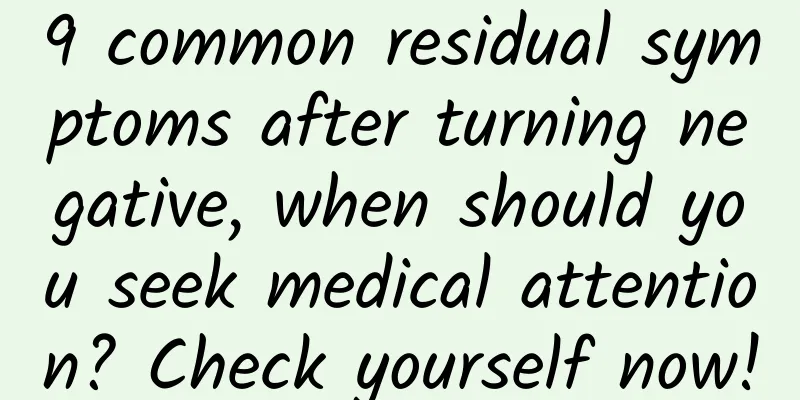9 common residual symptoms after turning negative, when should you seek medical attention? Check yourself now!

|
Some people may still have some symptoms after a few weeks of recovery. So, which ones can gradually recover normally? Which conditions require prompt medical attention? 01 9 common residual symptoms of "Yangkang" In what situations should you seek medical treatment? 1. Cough - severe cough lasting for more than 3 weeks Coughing even after the test result turns negative is an important defensive reflex of the body, which helps to clear respiratory secretions and harmful factors. However, it is recommended to go to the hospital for treatment in the following situations. Lu Lijun, deputy chief physician of the Department of Pulmonary Diseases at the Wuhan Hospital of Traditional Chinese Medicine in Hubei Province, reminded in an interview with the Hubei Radio and Television Media News Center on December 23 that if you experience coughing up blood (blood in the sputum), worsening cough at night (or when changing body position), coughing up large amounts of yellow purulent sputum, or fever again, and the original symptoms such as shortness of breath, difficulty breathing, chest pain are significantly aggravated, it is recommended to go to the hospital for treatment. In addition, if the cough is severe, affects daily work or sleep, or lasts for more than 3 weeks, it is also recommended to go to the hospital for treatment. 2. Shortness of breath (shortness of breath) - noticeable shortness of breath with minimal activity The Q&A on the Prevention and Treatment of Novel Coronavirus Infection with Traditional Chinese Medicine (First Edition) reminds that the following situations require prompt medical treatment: (1) Very noticeable shortness of breath after even the slightest activity, which cannot be relieved by any posture that relieves shortness of breath; (2) The degree of shortness of breath changes while at rest and cannot be improved by any breathing control techniques; (3) chest pain, rapid heartbeat, or dizziness during certain postures, activities, or exercises; (4) Weakness in the arms and legs, especially on one side of the body. 3. Fatigue - accompanied by dyspnea that cannot be relieved Fatigue is one of the most common symptoms of the recovery period of COVID-19 infection. Li Dongzeng, chief physician of the Department of Infection at Beijing You'an Hospital, said in December 2022 that many people will have persistent physical fatigue and weakness, and even some symptoms of chest tightness after infection, which usually can be relieved within two weeks. "Questions and Answers on Traditional Chinese Medicine Prevention and Treatment of Novel Coronavirus Infection (First Edition)" reminds that if fatigue is accompanied by breathing difficulties that cannot be relieved, you need to go to the hospital for treatment in time. 4. Insomnia - does not improve within 7 to 10 days After being infected with the new coronavirus, you may experience symptoms such as difficulty falling asleep, short sleep duration, shallow sleep, and frequent dreams during the recovery process. Sun Wei, deputy chief physician at the Sleep Medicine Center of Peking University Sixth Hospital, said in an interview with CCTV News in January that some symptoms after COVID-19 infection, such as body pain and coughing, can interfere with sleep; insufficient adenosine secretion in the body can also lead to difficulty falling asleep. It is recommended to calm down and sleep will automatically improve after the body recovers; try to maintain a relatively stable schedule; if insomnia symptoms are severe, seek medical attention. Wang Ting, director of the Department of Mental Diseases at Nanjing Hospital of Traditional Chinese Medicine affiliated to Nanjing University of Chinese Medicine, said in an interview with Ziniu News, "After being infected with the new coronavirus, fatigue, drowsiness, insomnia, and easy fatigue are all common pathological reactions. Generally speaking, after 7 to 10 days of rest and adjustment, the symptoms will gradually disappear. For some patients, the symptoms may last longer. If the condition does not improve within 7 to 10 days, you can go to the hospital for treatment. 5. Pain – Increased pain During the novel coronavirus infection and recovery process, some patients may experience pain symptoms such as bone and joint pain, muscle aches, and sore throat. However, if you experience obvious chest pain or severe headache, you should go to a medical institution for treatment in a timely manner. Pain does not affect sleep and can be improved through a good lifestyle. If pain interferes with sleep, medication can be used under the guidance of a doctor. However, if there is a local tingling, burning, electric shock, numbness or pain that worsens when touched, it indicates local nerve damage. 6. Palpitations - Seek medical attention in three situations Zhou Yujie, executive vice president of Beijing Anzhen Hospital, pointed out at a press conference of the Joint Prevention and Control Mechanism of the State Council on January 16 that when a person has a fever, the heart rate will increase by 10-12 beats for every 1°C increase in body temperature. If you have a fever, a fast heart rate is normal. When the heartbeat is fast and there is also palpitations, shortness of breath, and frequent wheezing, you should seek medical attention immediately when it reaches this level, especially when you are a person who does not have a fever and starts to feel palpitations again. The heart rate increases by an average of 10 beats per minute. This is a relatively common phenomenon in our hospital, but a check of myocardial enzymes shows no problems and the electrocardiogram is normal. (This is) a condition of sympathetic nerve excitement and you will slowly recover. The Q&A on the Prevention and Treatment of Novel Coronavirus Infection with Traditional Chinese Medicine (First Edition) reminds that if the following three situations occur, you should seek medical attention immediately: (1) If you have underlying heart diseases, such as coronary heart disease, heart failure, etc., and experience increased heart rate, chest tightness, chest pain, shortness of breath, etc. after COVID-19 infection, it is not necessarily myocarditis. It may be that the original coronary heart disease has worsened. You should seek medical attention as soon as possible. (2) If you experience hypoxia, increased breathing and heart rate, or panic, you should go to the emergency department of a hospital. (3) If the resting heart rate exceeds 100 beats per minute or is less than 60 beats per minute, or if irregular heartbeats occur, be alert to the occurrence of viral myocarditis and it is recommended to go to the hospital for examination in time. 7. Sound problem - no improvement for a long time COVID-19 infection can cause a sore throat, an irritating cough, phlegm in the throat, and frequent throat clearing. A weak, wheezy, or hoarse voice may also occur, especially after being on a ventilator in the hospital. If there is no improvement after a long period of time, it is recommended to consult a medical professional. 8. Swallowing problems – coughing or choking when eating If you have trouble swallowing food and drinks, it's because the muscles that help you swallow may be "weakened." If you cough or choke when eating or drinking, consult your healthcare provider to rule out the possibility that food or drink has entered your lungs. 9. Decreased sense of smell and taste - most recover within a month The patient is now “Yang Kang”, but cannot smell the aroma of food or taste the sour, bitter, sweet, and salty flavors of food. Most people with reduced sense of smell and taste will recover within a month after being infected with the new coronavirus. Gu Mingyou, chief physician of the Department of Otolaryngology at the Third People's Hospital of Beilun District, Ningbo City, Zhejiang Province, said in an interview with Qianjiang Evening News on December 30, 2022 that if the loss of smell is only caused by local damage to the nasal mucosa, it will recover in about a week. If it is caused by viral damage to the nerves, the recovery time will be slightly longer, generally two months or longer. You can do olfactory training on a regular basis, including smelling lemons, roses, cloves, etc. twice a day for 20 seconds each time. If there is no recovery after 3-4 weeks, it is recommended to visit the dental and ENT clinics for evaluation. 02 Don’t worry! Most of the remaining symptoms will return! A study published in the British Medical Journal (BMJ) on January 11 this year included more than 290,000 people with mild infections and analyzed the early (1-6 months) and late (6-12 months) conditions after infection. The study found that most symptoms after a mild COVID-19 infection returned to normal within a year, and vaccinated people had a lower risk of breathing difficulties than unvaccinated people. After mild COVID-19 infection, the risk of multiple diseases increased significantly, especially in the first 1-6 months after infection, and then decreased, with differences in risk between different age groups. The main symptoms include loss of smell and taste, cognitive decline, dyspnea, weakness, palpitations, and hair loss, chest pain, cough, muscle aches, and respiratory disorders recovered by 6-12 months after infection. The research team said that although people have been worried and discussed about "long COVID" since the beginning of the COVID-19 pandemic, this study shows that the vast majority of patients with mild COVID-19 do not suffer from serious or chronic long-term diseases. Source: Health Times The cover image of this article is from the copyright library Reproduction of image content is not authorized |
<<: 9 things you need to know before stocking up on cherries for the Spring Festival!
Recommend
GSMA: China's 5G vertical industry application cases in 2022
2021 is a critical year for 5G to achieve initial...
How much is the investment price for Guangzhou Tea Mini Program? Guangzhou Tea Mini Program Merchant Price Inquiry
How much does it cost to attract investment for t...
Lao Duan talks about OTT: The lost decade of cable TV
In the past 20 years, cable networks have focused...
200,000-level domestically produced large seven-seater, the new Tang DM-i and the Trumpchi ES9, which one do you choose?
On October 25, the 2025 BYD Tang DM-i was officia...
Can fitting rooms become an important O2O scene in the clothing industry?
Regarding the Uniqlo nude photo scandal, as the f...
How to establish a user incentive system to enhance user stickiness?
Most mature apps now have a similar membership sy...
Internet operation system and data analysis!
Many people start the analysis based on data such...
World-class open source project: How TiDB redefines the next generation of relational databases
[51CTO.com original article] Huang Dongxu, the au...
Kobe Bryant endorses Ele.me, and it only takes five steps to pass the level!
These days, Kris Wu is the spokesperson for Honor...
14 of them appear at once? The "bugs" are resurrected, be careful not to be sprayed by the "stinky fart bugs"...
As spring arrives and flowers bloom, all kinds of...
Do you often feel pain here and there? Don’t just endure chronic pain anymore. Here are 5 ways to relieve it.
Pain is a warning signal from the body Just like ...
Digging and digging in the soil...the tiny earthworms contribute so much to global agricultural production!
Science Times reporter Wu Tong A paper published ...
The “20-minute park effect” has become popular, but what do you do in the park?
The “20-minute park effect” has become popular. T...
GAC New Energy and Aptiv jointly develop advanced driver assistance systems and will prioritize the launch of L3 autonomous driving vehicles next year
On August 20, Aptiv announced that it will build ...
Deep learning has become a magic weapon for front-end development: automatically generating code based on UI design drawings
A neural network may be needed between UI designe...









